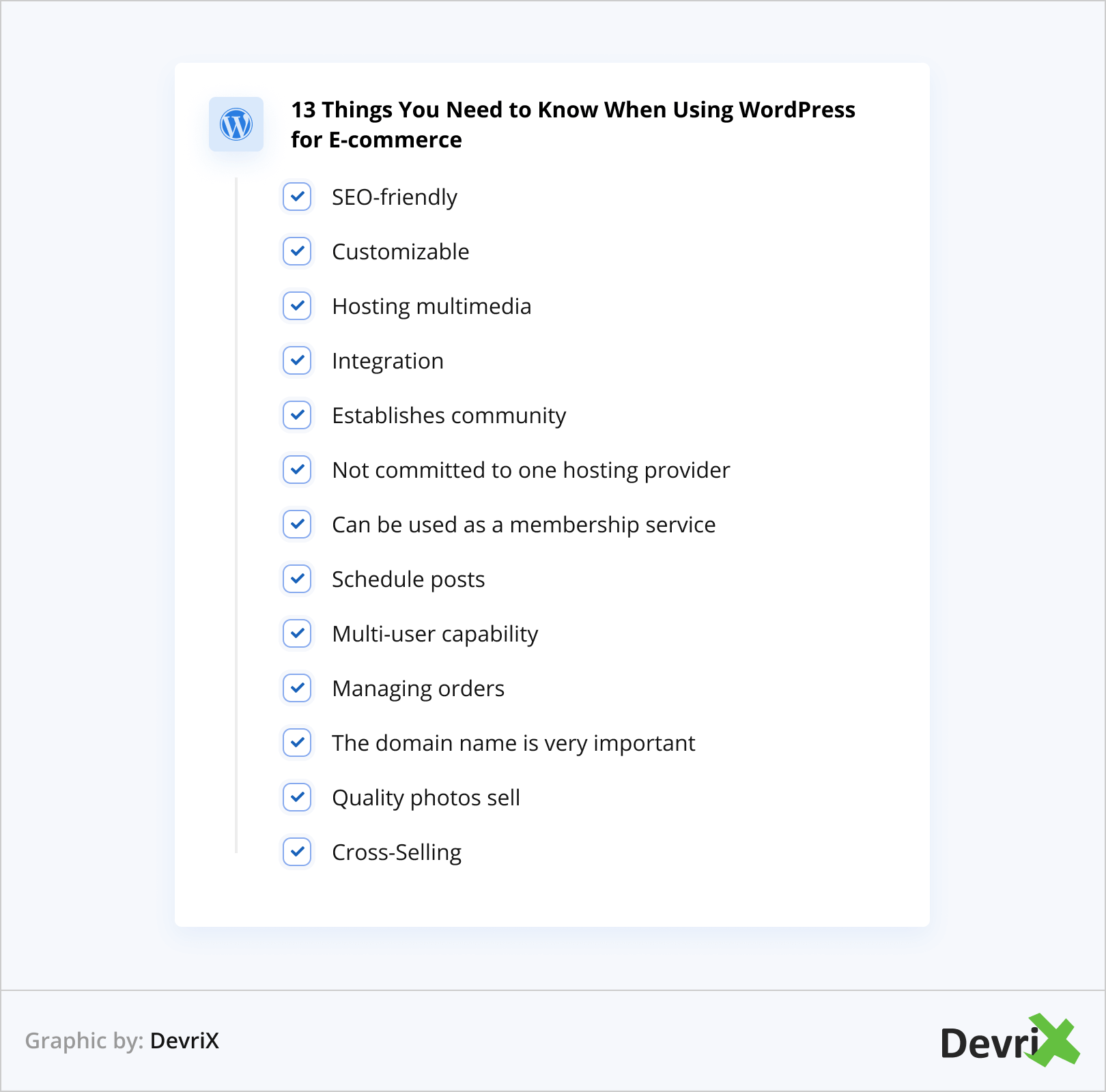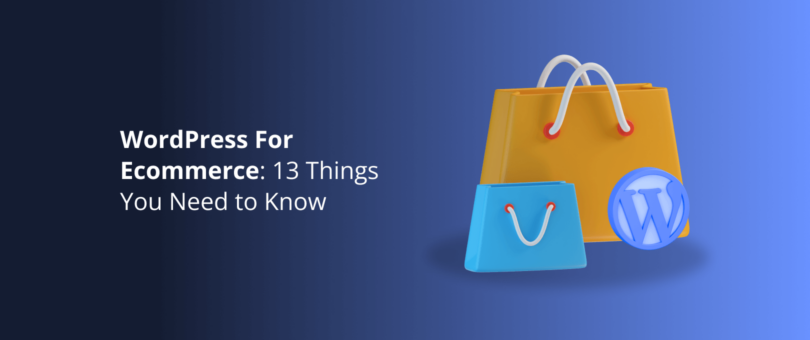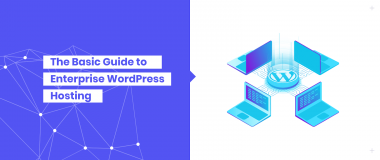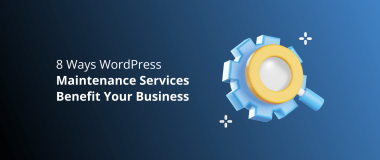The growing eCommerce industry is certainly an incentive for business owners to set up their own eCommerce sites. While this may seem daunting at first, WordPress for eCommerce can help you along the way and make this task as painless as possible.
As a leading WordPress development agency, we scale a number of eCommerce stores generating tens of millions in GMV. Being an active member of the community, we want to help starting store owners and small shops moving to WooCommerce making the best decisions in their first journey with the platform.
WooCommerce Leads The Way
Why choose WordPress for your eCommerce business? Because platforms like WooCommerce (a WordPress plugin) open a wide array of opportunities for you. It can make your eCommerce business attain success due to its competitive features suitable for marketing trends.
Moreover, it enables your site to answer these questions:
- Will your site perform excellently on all levels of design and functionality?
- Can you effortlessly create an atmosphere for shopping that customers will enjoy?
If you do build a great experience, customers tell each other about that. Word of mouth is very powerful. – Jeff Bezos, Founder of Amazon.com
So, are you excited to get started on your WordPress eCommerce website? There are already millions of business websites using WordPress. However, take your time to learn these few, but very important, eCommerce terms.
Recommended: How to Migrate From Shopify to WooCommerce: Step by Step Guide
Important eCommerce Terms
- Cart Abandonment. Users don’t complete their purchasing transaction because of something unexpected like a shipment fee or hidden charges.
- Average Time on Site. The average amount of seconds a user spends on your site. This calculation is based on all site visitors within a given time frame.
- Conversions. Also known as Average Order Value (AOV).
- Cookies. These are bits of information stored in a user’s browser. eCommerce uses cookies for ad targeting, dynamic website content based on user signals and saving shopping carts (also known as “a persistent shopping cart”).
- Order Tracking. The process in which a customer can check an order’s delivery status. Generally, a tracking code is issued upon the completion of the purchase.
- Product Affinity. Products that are frequently bought together.
- Product Relationship. Products that are viewed frequently by the same user.
12 Things You Need to Know When Using WordPress for Ecommerce
- SEO-friendly
- Customizable
- Hosting multimedia
- Integration
- Establishes community
- Not committed to one hosting provider
- Can be used as a membership service
- Schedule posts
- Multi-user capability
- Managing orders
- The domain name is very important
- Quality photos sell
- Cross-selling

WordPress has thousands of themes and plugins loaded with features that can help you optimize your eCommerce site.
1. SEO-friendly
It is a task that should be given major attention. A site’s visibility holds a promising future for your business. So, if you are working on how to make your eCommerce business rank higher on search engines, think WordPress.
It has a framework that is easy to crawl. In fact, Google’s Matt Cutts endorsed WordPress during WordCamp San Francisco, 2009. You can find his personal blog on WordPress.
Here are several actionable points on how to bootstrap your SEO efforts for any WooCommerce website:
- Ensure each product has a unique, descriptive title using target keywords pulled from Semrush or Ubersuggest
- Write comprehensive product descriptions that are both user-friendly and keyword-rich
- Avoid duplicate content; each product should have its own unique description (same goes for titles and the majority of the product copy)
- Use schema markup to provide search engines with more information about your products, such as price, availability, and reviews
- Test your site’s mobile usability with Google’s Mobile-Friendly Test as Google’s indexing is mobile-first
- Link related products together to encourage users to browse more of your site
2. Customizable
WordPress site is customizable; therefore you can freely update your eCommerce site anytime. You may use its list of shortcodes to add functionality without writing any code.
Ecommerce leaders will have to keep with these changes (and others) to survive and stay ahead. – Linda Bustos, E-commerce Expert from Get Elastic
This may look like a no-brainer, but being stuck with a hosted eCommerce platform like Shopify or BigCommerce can hit limitations as your store grows – such as inconsistent URL structure for SEO, the inability to launch multiple stores under the same hat (multisite), troubles scaling multilingual stores with different local regulations (to name a few.)
Stepping on a proven open source platform is a great way to mitigate these risks.
3. Hosting Multimedia
Sound and motion are two variables that essentially make your site interactive. Multimedia content is important in this current marketing mix.
Therefore, to boost sales, you must quickly capture your target audience’s attention. So, engage with them with images, audios, and video files in addition to your other tricks and techniques.
This task is made easier by WordPress by inserting multimedia files into your sales page or products gallery without hassle. Moreover, you can edit them anytime you like. WordPress is really a handy platform to improve your eCommerce business functionality and interface.
Pro Tip: Over 75% of people shop online at least once a month (BigCommerce).
4. Integration
This is one of the special features of WordPress because you can advance the performance of your website by integrating other applications with it.

The WordPress Plugin Directory is the largest directory of free and open-source WordPress plugins
In marketing your products and services, sometimes you need to integrate other powerful platforms to give your business an additional boost.
Aweber and Mailchimp, for instance, help a lot in increasing your list of subscribers and customer database. In addition, WordPress can also work with popular payment gateways.
There are tens of thousands of WordPress plugins out there – and thousands of WooCommerce-specific extensions solving anything from taxes through abandoned cards support to BNPL integrations and order tracking & upsells.
5. Establishes Community
Having people talking freely and helping one another adds to the value of your website. A Forum or Message Board is essentially a vital aspect of your e-commerce business.
This increases your brand awareness and credibility. Besides the Contact Page, customers and prospects can easily access a supportive community that your site has established. The interaction with the admin and the users on the message board helps to strengthen the bond.
6. Not Committed to One Hosting Provider
If you need to switch a provider or host, you can now do it without experiencing too much downtime. This is because WordPress works well with pretty much every server.
So, if you need to make the switch, review the following article from WPBeginner. There are several free WordPress hosting options as well.
High-scale solutions – especially stores maintaining thousands of products or generating millions of monthly views – require professional hosting support at scale. This is why Pagely is our trusted partner for our largest WooCommerce solutions here.
7. Can Be Used as Membership Service
If your WordPress eCommerce business is designed for membership service, WordPress is ready to get you going instantly. You can start selling subscription plans for your service or products in the members’ area.
Subscription plans can be tied to physical product (such as ordering extra ink for printers) or digital ones – like access to your entire digital library of ebooks or whitepapers.
This is one of the key strong suits of WooCommerce. Being a WordPress plugin in nature enables you to expand the core feature set to a membership site, introduce a social directory, grow into a social network – and still maintain the commerce capabilities.
8. Schedule Posts
A time-consuming task is scheduling posts, say for example, a sales promo or new product launch. Thankfully, WordPress is designed for such a purpose.
This is especially important for seasonal campaigns such as Black Friday or Amazon’s Prime Day. In 2023, Amazon shipped over 375 million orders over the course of 48 hours on Prime Day. Smart WooCommerce store owners leveraged the marketing wave and provided discounts and coupon codes for their engaged audiences ready to shop.
9. Multi-User Capability
Your business is gearing towards the next level. There’s an inevitable need to add people to manage your site to maintain its quality. Thus, WordPress gives you the freedom to assign different roles to different individuals. Here is a summary of them from WordPress Codex:
- Super Admin
- Administrator
- Editor
- Author
- Contributor
- Subscriber
10. Managing Orders
This tedious admin task also has a direct effect on customer experience. In order to work out the mandatory obligations in reference to customers’ orders, consider using an order tracking plugin on WordPress.
11. The Domain Name Is Very Important
A memorable and credible domain name is essential for a successful eCommerce business. It serves as your online persona, and it is the first step toward effective branding.
Your domain name should be as descriptive as possible of your company or product so that potential clients can remember it. A catchy website title will assist in the acquisition of sponsors and advertisers, who are necessary for a successful eCommerce operation.
Because your domain name is so vital, you should choose a web hosting business that allows you to transfer your domain name if you move providers. As a result, you can rest assured that your online identity will always be in your hands.
12. Quality Photos Sell
High-resolution, zoomable product pictures from several angles are required for a successful eCommerce site. You can’t always get a good look at what you’re purchasing when you shop online. Having excellent photographs will aid in the reduction of returns and complaints.
Good product photography is a must when it comes to online stores. Product images that are in the best light possible and that help potential consumers understand what they’re seeing are crucial to effective eCommerce. Visuals such as 360-degree spin content, as well as image and video, have been on the rise for some time.
As a result, buyers get a far greater picture of the product and how it functions, ensuring fewer returns and complaints. Make sure you invest in high-resolution product photos if you’re selling items online. It will be well worth your money, we assure you!
13. Cross-Selling
Cross-selling is an exciting sales technique that can take your eCommerce revenue to the next level. It’s all about delighting customers by recommending complementary products that enhance their original purchase. For example, when someone buys a stylish new smartphone, you could suggest a case to complete the look.
Cross-selling makes the shopping experience more fun and rewarding for customers. And it allows you to increase the average order value in a natural way.
With the right WordPress eCommerce plugins, cross-selling becomes super easy to set up. You can automatically display enticing product recommendations throughout the customer journey – on product pages, cart pages, checkout pages, and more. The suggestions can even be personalized based on the specific items in someone’s cart or their browsing history.
So if you run an online store, embrace cross-selling to boost satisfaction and sales. WordPress makes it simple to highlight those extra products that shoppers will love. It’s an effortless way to create a more engaging shopping experience while ringing up more registers.
Conclusion
Selling services and products requires a great eCommerce platform to handle the different, and often complicated, tasks. As an entrepreneur, your customers come first. Good business practices should also be maintained.
Thanks to WordPress eCommerce, you can now handle business transactions and other activities efficiently and effectively. Moreover, its growing list of products that cater to the users’ needs is insightful and can increase your awareness of how to maximize your website.




